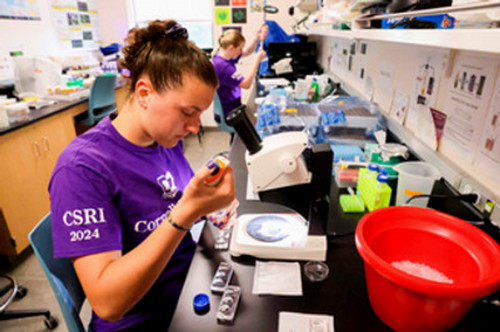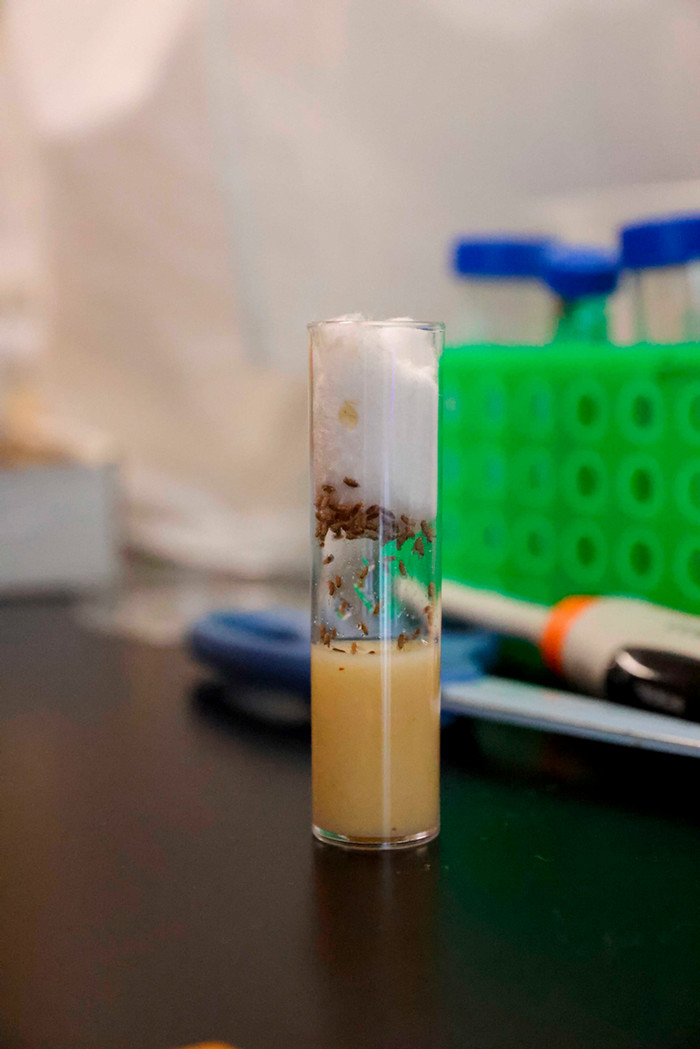A team of Cornell Summer Research Institute (CSRI) students are studying fruit flies to understand more about what keeps our muscles healthy.
Sophomores Everett Ahlberg, Gwen Schaffer, Jillian Shriver, and junior Maiha Richardson worked side-by-side with Assistant Professor of Biology Nicole Green in Cornell’s fly lab on the first floor of Russell Science Center for the eight-week institute.
“We’re asking, broadly, what factors–what molecules and genes–are important for proper muscle development and to keep muscles healthy,” Green said. “And on the flip side of that, what happens if those factors aren’t present? How does that possibly lead to diseases like muscular dystrophy and myopathies that we see in human populations?” 
Fruit flies are a model organism–a non-human species scientists use to understand biological processes. Flies share many features with humans and can provide information that helps us understand human health.
“We’re dissecting larvae of regular fruit flies that we would expect to have normal muscle development and looking at how that muscle looks under a microscope. Then, we’re also dissecting flies that are fed aspirin to see if their muscle physically looks different under the microscope,” said Shriver, who plans to declare a major in biochemistry and molecular biology during the upcoming year.
More specifically, the CSRI team studied the production of prostaglandins, which is a signaling molecule that helps the body with muscle regeneration. But exactly how or where prostaglandins might be important in muscle development is unknown. The students examined the crawling and climbing abilities of healthy and aspirin-fed larvae and flies to see what effect aspirin has on them. They also dissected and used advanced microscopy techniques to see the effect of aspirin on the muscle tissue itself. In the future, the Green lab will look at what happens if they mutate the gene responsible for the production of prostaglandins.
“Aspirin is going to dial down your prostaglandins in your body,” Green said. “We know a lot about how aspirin works in terms of immune function and inflammation and pain relief and those things, but there’s still a lot of questions about how that drug works on other tissues in the body.” 
During CSRI, the team worked closely with their professor for two blocks worth of time studying the questions they were interested in and questions that could have a much larger impact on the future of understanding our bodies. They know this experience will help them with future careers.
“I want to be a pediatrician,” says Ahlberg, who is planning to declare a major in biochemistry and molecular biology this academic year. “So, for the AMCAS (American Medical College Application Service) and applying to medical school, a lot of research hours are needed. I want to get a good amount of research hours and be able to make an impact.”
Plus, science is fun.
“Oh my gosh, it's super fun. My dream since I was a child was to do research,” says Richardson, a behavioral neuroscience major. “I’ve always been a little bit afraid because I do have a visual impairment, so I didn’t know how much that would impede my ability to do research. And here I am working with tiny flies. It's awesome to work with Nicole because she’s super helpful at making things accessible for me. For example, when we’re dissecting the larvae, they’re clear, so it’s really hard for me to cut, but we found out that, we have this methylene blue that I can use to stain the larva and it makes my cuts clearer, so I can more easily go in there and dissect.”
The Cornell Summer Research Institute runs each summer for eight weeks. Students work directly with their professors on one of many intensive research projects across several disciplines.